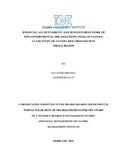Financial accountability and humanitarian work of Non-Government Organisations (NGOs) in Uganda: A case study of Uganda Red Cross Society, Mbale Region
Abstract
The main objective of the study was to assess the effect of financial accountability on the execution of humanitarian work by the Uganda Red Cross Society in Mbale district. The study was motivated by increased accountability queries for URCS staff dealing in humanitarian operations. Consequently, the study was conducted in 6 villages affected by landslide and flood disasters. Specifically, the study sought to establish the effect of budget planning, internal controls and record-keeping on the execution of humanitarian work by the Uganda Red Cross Society. During the study, a total of 174 respondents participated in the study. A case study research design was used and primary data were collected by questionnaires. Data collected were analyzed both qualitatively and quantitatively. Descriptive and inferential statistics were used in the analysis. Research findings revealed a positive effect of budget planning on the execution of humanitarian work by URCS. In addition, a positive relationship between internal controls and execution of humanitarian work was found to exist implying that internal controls had a positive effect on the execution of humanitarian work by URCS. Likewise, record-keeping had a positive effect on the execution of humanitarian work implying that record-keeping facilitated the execution of humanitarian work by URCS. The study concluded that financial accountability had a positive effect on execution of humanitarian work in Mbale district. In order to improve accountability and offer efficient humanitarian assistance to populations affected by a disaster, the study recommended staff training in the use of advanced technology in form of computerized record-keeping and accounting systems; involving local leaders in the assessment of victims for assistance and distribution of assistance. In addition, there was need to increase committed and skilled staff, especially in the accounts department to prepare them for the challenging task of financial management and adapting effective mechanisms of accountability enforcement like fines, warnings and suspensions.

